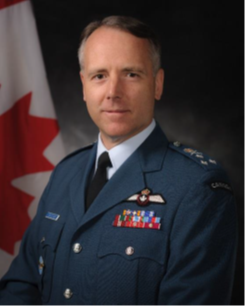March 2020 - Royal Canadian Air Force (RCAF) - Lieutenant-General Al Meinzinger
Archived content
This page was proactively published to meet the requirements of the Access to Information Act. It is a historical record which was valid when published, but may now contain information which is out of date.
Biography
- Appointed in May 2018
- Pilot with 34 years of service
- Experience in Haiti, Afghanistan, 1 Canadian Air Division, North American Aerospace Defense Command (NORAD), Royal Military College and National Defence Headquarters.

Mandate
- Provides the Canadian Armed Forces (CAF) and the Government of Canada with relevant, responsive and effective air and space power to meet the defence challenges of today and into the future.
- Provides control and surveillance of the Canadian territory, air, space and maritime approaches
- In cooperation with the US, the RCAF directly contributes to NORAD’s aerospace warning and control mission
- Force generates all air and space power capabilities (e.g. search and rescue, air mobility, long range patrol, etc.)
- Provide the Chief of the Defence Staff with advice on the Air and Space domain.
Key facts
Total Employees:
- 12,074 Regular Force Personnel
- 1,969 Reserve Force Personnel
- 1,518 Civilian Personnel
Budget:
- $1.06B
Primary location(s):
- National Defence Headquarters (Pearkes Building)
- 14 Wings operating from 43 locations, including nine bases, across Canada
Key Partners
Internal:
- Various Department of National Defence and Canadian Armed Forces organizations
External:
- Air Chiefs of the United States, United Kingdom, Australia, and New Zealand; North Atlantic Treaty Organization Air Chiefs, System of Cooperation Amongst the Air Forces of the Americas (SICOFAA) Air Chiefs.
Top issues for the Royal Canadian Air Force
Op EXPERIENCE and Op TALENT
- Global demand for aviation expertise has negatively impacted the overall trade health of RCAF Pilots and Technicians.
- Retention of experienced RCAF personnel is key to maintaining delivery of air and space power.
- Op EXPERIENCE and TALENT seek to ameliorate the experiential gaps through targeted growth and retention initiatives that enrich quality of service and improve quality of life for RCAF personnel and their families.
- Results of analysis and recommended compensation and benefits for RCAF Pilots is expected to be available in December 2019.
Future Aircrew Training (FAcT)
- The FAcT Program will replace the CAF’s current Pilot, Air Combat Systems Officer and Airborne Electronic Sensor Operator training systems.
- After sharing the final draft Request for Proposal (RFP) with the qualified suppliers, the FAcT team will initiate an internal review of the RFP documentation prior to its official release during the first quarter of 2020.
- The qualified suppliers will be granted approximately 8 months to prepare their bids. It will then take approximately 6 months to conduct the bid evaluation.
Fighter Capability
- December 2019 notification to Suppliers on acceptability of Initial Security Offer to meet Canada's security/interoperability requirements for Future Fighter.
- Submissions are due end March 2020 after which evaluation of Future Fighter proposals will commence.
- Continued delivery of 18 total Royal Australian Air Force F/A-1 aircraft to Canada with full operational capability expected in December 2022.
- Hornet (CF-18) Extension Project is progressing with upgrades to secure communications and expenditure authority for final operational enhancements in February 2020.
CC-144 Challenger issue/replacement
- The CC144 fleet is mandated to support Administrative Flight Services to the federal government and Utility Flight Service to the CAF on an “as available” basis.
- RCAF analysis has concluded that [REDACTED] from forecasted fleet obsolescence, unforecasted pilot releases and ongoing maintenance challenges, [REDACTED].
Enhanced Participation in Space Operations
- CAF’s space-related activities are critical for the defence of Canada and support operations both at home and abroad.
- Protecting and defending these capabilities is dependant on advancing cooperation and collaboration in combined space operations with close allies and partners.
- Op OLYMPIC DEFENDER will provide the essential synchronizing framework to face the security challenges in the space domain.
Page details
- Date modified:

